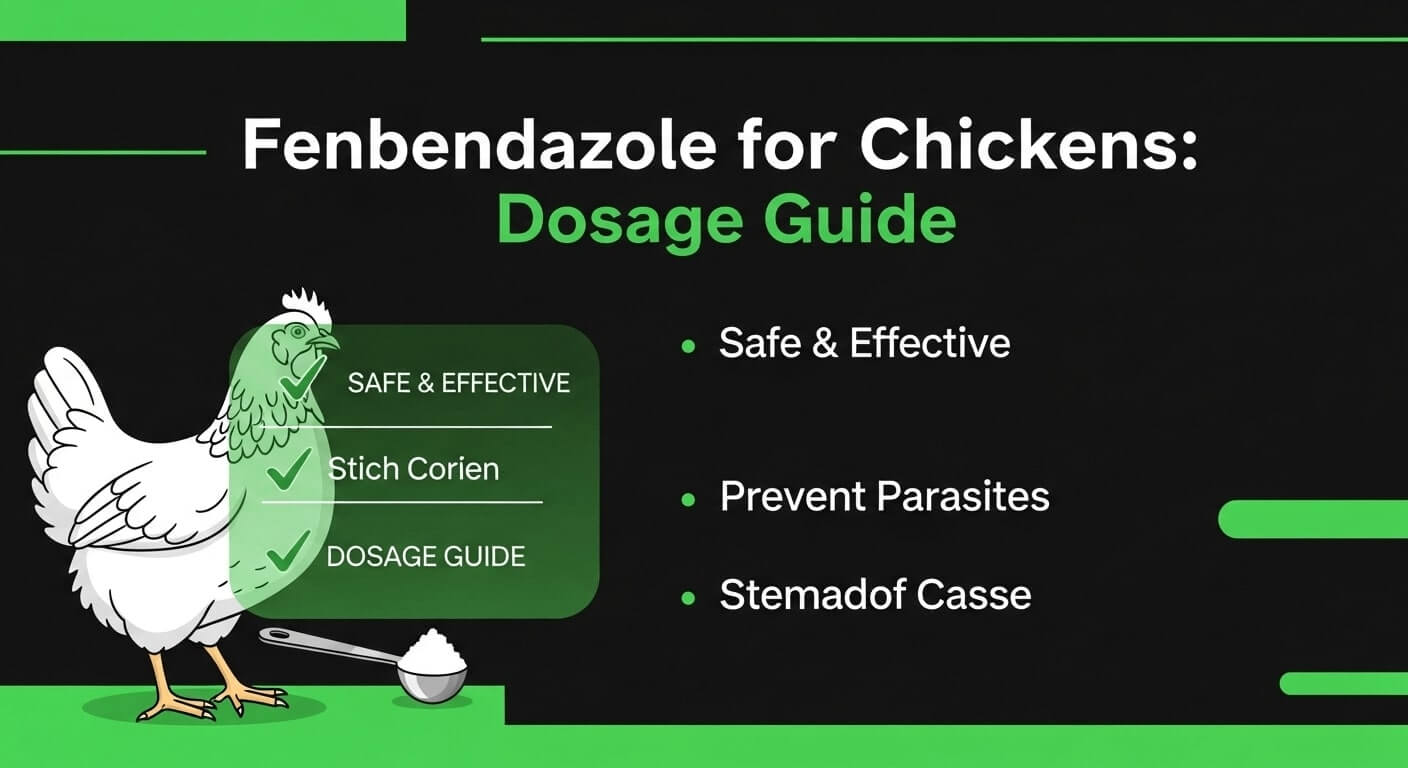
Fenbendazole for chickens dosage – If you’re a poultry owner, keeping your chickens healthy is a top priority. One common issue that affects chickens is parasitic infections, which can lead to poor growth, reduced egg production, and even death if left untreated. Fenbendazole for chickens dosage is a critical topic for anyone looking to effectively deworm their flock. In this comprehensive guide, we’ll cover everything you need to know about using fenbendazole, including the correct dosage, administration methods, safety precautions, and more.
What Is Fenbendazole?
Fenbendazole is a broad-spectrum anthelmintic (dewormer) used to treat various internal parasites in chickens, including:
It works by disrupting the parasites’ energy metabolism, effectively killing them without harming the host (your chickens) when used correctly.
Why Use Fenbendazole for Chickens?
Internal parasites can severely impact your flock’s health by:
- Reducing nutrient absorption, leading to weight loss
- Causing diarrhea and dehydration
- Lowering egg production
- Increasing susceptibility to other diseases
Using the correct fenbendazole for chickens dosage ensures that your birds remain parasite-free and healthy.
Correct Fenbendazole for Chickens Dosage
The standard fenbendazole for chickens dosage is:
- 20 mg per kilogram (kg) of body weight
- Administered for 3-5 consecutive days
How to Calculate the Dosage
- Weigh your chicken: If you don’t have a scale, estimate based on breed averages:
- Bantam: ~1 kg
- Standard layer: ~2-3 kg
- Large breed (e.g., Jersey Giant): ~4-5 kg
- Calculate the dose:
- For a 2 kg chicken: 2 kg × 20 mg = 40 mg fenbendazole per day
Available Forms of Fenbendazole
Fenbendazole comes in several forms, including:
- Liquid suspension (e.g., Panacur 10%)
- Powder/granules
- Paste
Each form requires careful measurement to ensure the correct fenbendazole for chickens dosage.
How to Administer Fenbendazole to Chickens
1. Mixing with Feed (Most Common Method)
- Crush fenbendazole tablets or measure the liquid/powder.
- Mix the correct dose into a small portion of feed.
- Ensure each chicken consumes the medicated feed.
2. Direct Oral Administration (For Precise Dosing)
- Use a syringe (without a needle) to give the liquid dose directly into the beak.
- Ensure the chicken swallows the medication.
3. Water Administration (Less Accurate)
- Dissolve fenbendazole in drinking water.
- This method is less reliable since water consumption varies.
Safety and Precautions
While fenbendazole is generally safe, follow these precautions:
- Do not overdose: Excessive amounts can cause toxicity.
- Withdrawal period: Stop treatment at least 14 days before slaughter or egg consumption to avoid residue in meat/eggs.
- Avoid use in severely debilitated birds without veterinary advice.
Signs of Parasite Infestation in Chickens
Before administering fenbendazole for chickens dosage, confirm if your flock has worms. Look for:
- Weight loss despite normal eating
- Diarrhea or bloody droppings
- Pale combs/wattles (anemia)
- Visible worms in feces
- Reduced egg production
Frequently Asked Questions (FAQs)
1. How Often Should I Deworm My Chickens?
- Every 3-6 months for prevention.
- Immediately if worms are detected.
2. Can I Use Fenbendazole for Chicks?
- Yes, but at a reduced dosage (consult a vet).
3. Are There Side Effects?
- Rare, but possible lethargy or appetite loss.
4. Can Fenbendazole Treat External Parasites?
- No, it only works on internal worms.
Natural Alternatives to Fenbendazole
If you prefer natural dewormers, consider:
- Diatomaceous earth (food-grade)
- Garlic in water
- Pumpkin seeds
However, these are less effective than fenbendazole for chickens dosage for severe infestations.
Final Thoughts
Using the correct fenbendazole for chickens dosage is essential for maintaining a healthy flock. By following the guidelines above, you can effectively eliminate internal parasites and ensure your chickens thrive. Always monitor your birds for signs of reinfestation and practice good coop hygiene to prevent future outbreaks.
For more poultry health tips, stay tuned to our blog!


EdgTCqMMrXxuByGWdBG
January 18, 2026UrFQFjqBxDPUVMrrpdSvX